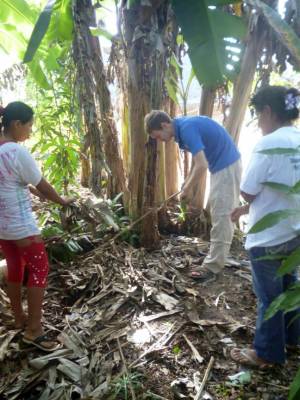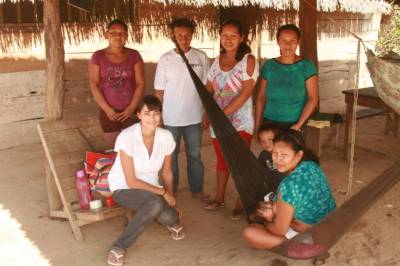This week Alianza Arkana began a new nutrition course with indigenous mothers from the Shipibo community of Puerto Firmeza. This workshop is part of our “Grow and Cook Program” that aims to preserve Shipibo culture, and increase food security and nutritional standards.
This program involves using permaculture and indigenous methods to plant traditional crops that have not been cultivated for several years, such as sachapapa and dale dale on 3 hectares of community land, and use these crops as the focus of cooking and nutritional courses.
The women from Puerto Firmeza are involved in the process of developing this program. For example, they helped design the kitchen that has been built to hold workshops, which is similar to traditional home kitchens utilized by Shipibo women.
In the 1st workshop, women learned how to make compost from the organic waste generated in their kitchens. All of the mothers participating in the workshop are now making their own family compost heaps in order to fertilize the crops they will begin to plant in June on their own plots.
In the nutrition/cooking classes programmed once a week for the next 6 months women will learn about the importance of eating balanced meals, including proteins, leafy greens and vitamins and minerals that are currently missing from their diets, and also about the dangers of white sugars and empty carbohydrates. However, as Alianza Arkana nutritionist Mariana Orta says, the classes are not about teaching them what they do wrong. Instead, the mothers will discover delicious and healthy recipes that incorporate nutritious foods such as sweet potato and spinach into their diets and supplement their traditional cooking methods.

In March this year Alianza Arkana permaculture expert Marcos Urquia began teaching children from Puerto Firmeza’s intercultural school Soi Sani how to grow crops. Now, mothers will share the new recipes they learn with their children, so the children will see how the plants they are growing taste and experience further benefits of what they have been learning. And these same children, aged from 5 to 16, will also take part in their own weekly nutritional workshops.
Prior to initiating this program, Ms. Orta spent six weeks living with Shipibo families in Puerto Firmeza and two other communities, Bena Jema and Santa Rosa de Dinamarca, in order to study their dietary habits.
The traditional diet in Shipibo communities like Puerto Firmeza features mainly plantain, fish, cassava, rice and seasonal fruits. In recent years, there has been an increasing trend towards the consumption in high amounts of refined sugar and carbohydrates and the use of cooking oil. Additionally, deforestation, soil erosion and influence of western culture are threatening food security among native peoples of the Peruvian Amazon. Simultaneously, Shipibo communities have experienced an increase in illnesses including diabetes, a phenomenon occurring in indigenous populations worldwide.
Wednesday, 22 May 2013

